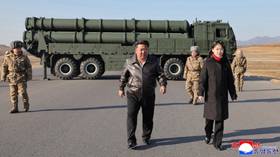High fail: Afghan opium production rises as ex-Blackwater profits
Opium production has been on the rise in Afghanistan over recent years despite US counternarcotics efforts. Infamous mercenary firm, formerly known as Blackwater, has creamed off $569 million from the Pentagon in this unsuccessful drive.
The money the company received from US tax-payers was used for “training, equipment, and logistical support” for Afghan forces engaged in counternarcotics operations. These agencies included the “Afghan National Interdiction Unit, the Ministry of Interior, and the Afghan Border Police,” says a report from The Special Inspector General for Afghan Reconstruction, or SIGAR, cited by the Guardian.
Formerly known as Blackwater, and later rebranded as Academi, the notorious company has been the biggest beneficiary of counternarcotics expenditure in the war-torn country.
However, the firm failed to eradicate opium production. In fact, this has reached record highs since the beginning of US occupation in 2001.
READ MORE: Record opium poppy cultivation has 5% of Afghan pop. using heroin
Since the US toppled the Taliban in 2002, opium production in the country has tripled. Afghanistan accounted for over 90 percent of the world’s heroin market in 2014.
A UNAIDS report from 2014 said that there is a 7-percent increase in land being cultivated despite the US spending over $7 billion on counternarcotics programs.
READ MORE: America’s $7.6 billion war on Afghan drugs fails, opium production peaks
The organization said poppy cultivation had expanded to 224,000 hectares in 2014, an increase of 7 percent. In contrast, a mere 74,000 hectares were being used to grow poppies in 2002, a year after the Taliban regime was ousted from power.
Not surprisingly, with more land being used to grow poppies, there has been an increase in opium production, the raw material for heroin. Around 6,400 tons of opium were produced in 2014, a hike of 17 percent over the previous year.
"In 2014, opium prices decreased in all regions of Afghanistan. One probable reason for the decrease was an increase in supply due to an increase in production," the survey said.
In December, the UN issued a separate report saying there had been a 60-percent growth in Afghan land used for opium poppy cultivation since 2011.
“Given the growth in opium poppy cultivation, it must be assumed that the Taliban’s income from the illegal trade in narcotics has remained an important factor in generating assets for the group,” the document said.
READ MORE: Blackwater guards convicted in 2007 Baghdad shooting
Blackwater was founded by former Navy SEAL Erik Prince and grew to become a private security giant with billions worth of contracts from the US government. After a series of deadly incidents dented the company’s reputation, Prince sold it. Blackwater was renamed three times eventually merging with its competitor Triple Canopy to form what is now called Constellis Holdings.
The company gained worldwide notoriety for the substantial role it played in the Iraq war as a contractor for the US government. It was allegedly behind the shooting deaths of 17 Iraqi civilians in Baghdad’s Nisour Square on September 16, 2007. Iraqi officials say the attack was without justification and in violation of deadly-force rules governing American security contractors at the time. Between 2005 and September 2007, Blackwater security staff were involved in 195 shooting incidents. In 163 of those cases, their personnel were found to have fired first.












